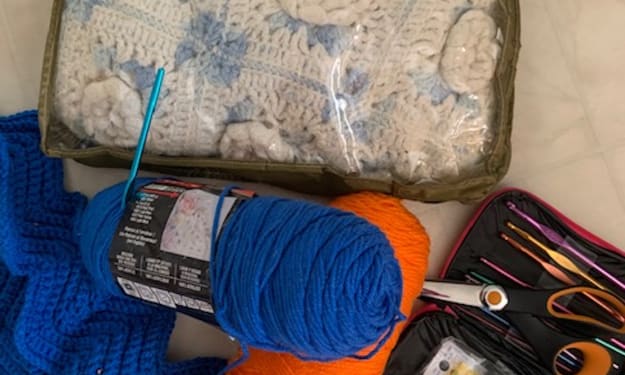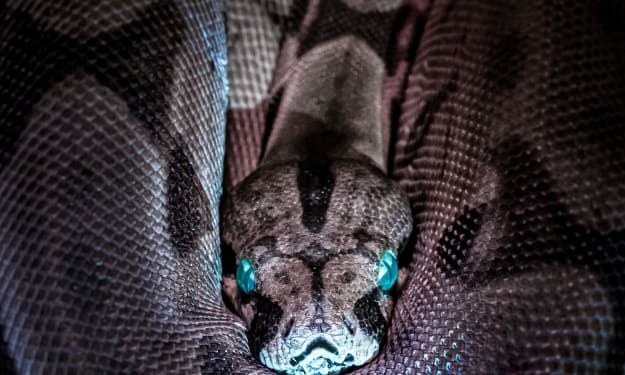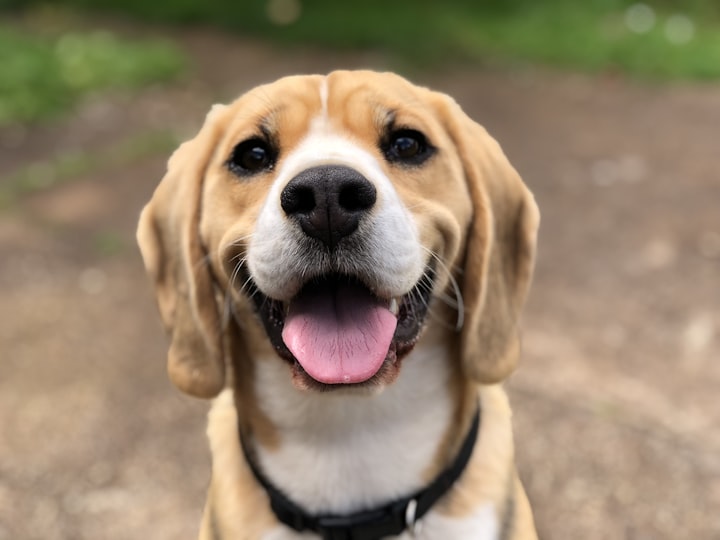Charles, the Great Escape Artist
Charles, the Great Escape Artist

In the world of dogs, Charles was a chocolate lab extraordinaire. He had the friendliest of friendly personality, loved everybody he met, human or fellow canine. He especially loved cats and would seek out his favorite, Baby Kitty, to sleep with whenever he needed a good, long nap.
He was a dog of many talents who, I swear, could understand every word you said, and respond accordingly. If you even whispered the words “cookie,” “treat” or “snack,” he was at your feet in a streak, smiling big and waiting for his share. Like all other dogs, he knew what “bye-bye” meant. But he also knew the difference between “vet” and “babysitter.” If you mentioned vet, his ears would perk up and he’d sit still as stone. But mention the babysitter and he’d jump up and down, bark, and run for the door. Need I mention he loved the babysitter, who showered him with attention, and who had a huge acreage of fenced in area where he could play with the other dogs to his heart’s content? He knew the word “no,” even though he only paid attention to it when he knew he had no other choice. And, he knew what “boat ride” meant. In all, his vocabulary probably totaled a couple hundred words — but maybe I’m being too conservative, as there were times when he could respond to commands several sentences long.
His most remarkable talent, though, was as an escape artist. He could leap tall chairs with a single bound at the sound of an opening door, blow through the tiniest sliver of light coming from that open door, and streak through the yard like a bolt of lightning as he ran toward freedom, whether it be an invigorating run around the neighborhood or a beeline for a dip in the lake. When left unattended outside the house, he could dig a mile-deep hole under the fence (at least it seemed like a mile), all in the pursuit of running free.
Free of a leash. Free of the fence. Free of the boundaries we, as humans, put on dogs to prevent them from running off into the wild blue yonder. His skills at escaping were both impressive and challenging for us. He could wriggle out of the snuggest collar and twist his leash out of your hand like soap in water if he wanted to chase a squirrel while you were walking him. In other words, if Charles could find a way to escape, he did. And getting him back was a trick in itself because Charles only came back when Charles was ready to come back. It didn’t matter if you were late for work or ready for bed, if Charles got loose you were at his mercy, and he knew it, and reveled in it. I have videos of him standing chest-deep in the lake, just out of my reach, taunting me, all but human-laughing at my feeble attempts to get him out of there.
I met Charles when I started dating my now-husband, Bill. I quickly learned that coaxing him out of the water or back from a run took some ingenuity and tricks of my own. I started out by yelling “COOKIE!” whenever he took off and waving a treat where he could see it. That strategy worked for a while. But soon the cookie lure wore off, forcing me to change tactics. One of my next tricks was to get in the car and drive toward where he’d run, and yell, “Let’s go bye-bye!” And Charles, always up for a ride, would bound into the car and I’d drive him around the block, knowing that if I went straight home he’d get wise and the trick wouldn’t work the next time. If he was in the water, we’d start up the boat and, ever eager to feel the wind flapping his ears as we raced across the lake, he’d leap from the water and onto the boat, and we would go on an impromptu boat ride. It was a game with him; what was most interesting, though, was that it was much easier for me to convince him to come back than it was for Bill to do it. If he got loose from Bill, it took a literal movement of both Earth and heaven to get him back in less than an hour.
As the years wore on and Charles began showing signs of aging, from gray hairs around his snout to a slower gait on his walks, he still never lost his penchant to run free if he had the chance. When he began having seizures, we gave him phenobarbital and watched him age even more, right before our eyes. When he got throat cancer, we hand fed him spoonsful of crushed ice for hydration and, for meals, a special rice and venison blend I made myself so we wouldn’t have to put him down. He would stand there complacent and calm, opening his mouth and swallowing the ice and the meal, almost as if he knew we were trying to help him hang on as long as we could. Yet, still, creaky bones, seizures and cancer aside, if he felt like taking off for a swim or a run, and if he had the opportunity, off he’d go. That’s why Bill would make extra-certain that the leash was secure and his collar was snug when they went out for their nightly walks.
And then it happened. One winter night Bill bundled up, put Charles on the leash and headed out the door. It was very cold, very dark and very icy, not a good night to be walking outside, but Charles needed walking and out they went. About a half-hour later I heard Charles barking. It was his “notification” bark, the one he used when he saw a squirrel or, at night, a possum or raccoon in the yard. It was a bark he used to announce to the world that he, Charles, had discovered something so exciting that he wanted everyone else to see it too. So, when I first heard the bark that night, I didn’t think much of it other than to say a quick prayer that whatever Charles had seen wouldn’t induce him to lunge away from Bill and either escape his collar or tear away with the leash. The last thing I wanted was to chase Charles in the dark in ice, snow and freezing-cold weather.
The thing was, Charles didn’t stop barking. In fact, as the minutes wore on, his barking became more intense, more insistent, and louder. Finally, I got up, opened the door and called for Bill. No answer. Thinking maybe Bill had gone off to chase Charles, I yelled at Charles instead, instructing him to “COME HERE! RIGHT NOW!” I didn’t have much confidence that Charles would come, but since his bark was so loud and close, I figured maybe I could get him to at least show his face so I could call for Bill again, to tell him where Charles was. So I yelled at Charles several times. And each time, in response, Charles barked more, with yelps in quick, urgent succession. Suddenly, I was worried. Where was Bill? I called for Charles again, with the same insistent, urgent tone he was using, and then he appeared at the corner of the house. His leash was dragging on the ground.
“Charles?” I said, firmly. “Come here. Where’s Daddy?” In answer, Charles stood his ground, did his urgent-call bark again, backed up a little, and furtively looking over his shoulder and then back at me, stepped forward and barked at me again, then backed up again and did the same wave of his head over his shoulder. And again. And again, repeating the process five or six times until it made me think of “Lassie” movies, where Lassie saves the day by fetching someone to follow her to whomever needs help. And then I realized Charles was trying to tell me something. He was trying to get me to follow him, and with a sinking feeling of dread, I knew it had something to do with Bill. I didn’t even bother to throw on my coat. I raced out the door into the cold, rounded the corner of the house and then I saw them: Bill was lying in the snow, moaning softly , on the ground at the bottom of an icy hill next to our driveway. And there was Charles, leash dangling, standing beside him, still barking, but less urgently and not as loudly, as if he were trying to talk to me. “See? Daddy’s in trouble! Daddy needs help and I’m helping!”
I tried to rouse Bill into talking to me, shaking him and grabbing for the cell phone I’d forgotten to put in my pocket. He came around just as I was getting up to run back for my phone and a coat, and I helped him stand up and limp into the house. All the while Charles just stood there like a statue. Just stood there, watching. With his leash dangling. He’d had every opportunity to run after Bill fell. He could have had a good romp in the snow and a race down the road and I never would have been the wiser for at least another half-hour when I may have gone out looking for them, after they’d been gone an uncomfortable length of time. But, instead, Charles had stayed by Bill’s side, barking and moving only when he heard me open the back door, and then only far enough away to allow me to see him while he continued to call for me. Ever the loyal companion extraordinaire, once Bill was up, he followed us up the porch stairs and into the house, then plopped down at Bill’s feet, with his leash still dangling at his side, when his daddy sank into a chair.
Some people say animals are stupid, that they don’t have feelings or other uniquely human emotions, but I’m here to tell you I know better. When Charles had the perfect opportunity to run like the wind, he stayed put, solid as cement. And called to me. And stood sentinel as I tended to his daddy and helped him back in the house. It wasn’t long after that when Charles crossed the Rainbow Bridge. He’d had a horrible seizure in the night that we didn’t know about; when we woke up he was lying in a pool of blood and blood clots that had spewed from his throat, perhaps during the seizure. Amazingly, he was still able to get up and even whimper a bit, indicating that he needed to go potty. For some reason we just opened the door and let him out, off-leash. He didn’t run. He only did his “job” and then sat there, staring at us with sad eyes. “Is it time to go to the vet, Charles?” Bill asked. “Is it time? We’ll only go if you say you’re ready to go.”
And then, as if he knew exactly what Bill was saying, Charles walked to the car and waited for Bill to open the door. We helped him get in and drove to the vet. Off-leash. When we got there, we let Charles out, off-leash, and let him walk around the vet’s yard a bit, and when he was ready, it was almost as if he knew it was time. He looked at us both, then led us to the door. Off-leash. And now I imagine him running and playing and swimming to his heart’s content in the world of dog heaven, always free. And off-leash.






Comments
There are no comments for this story
Be the first to respond and start the conversation.